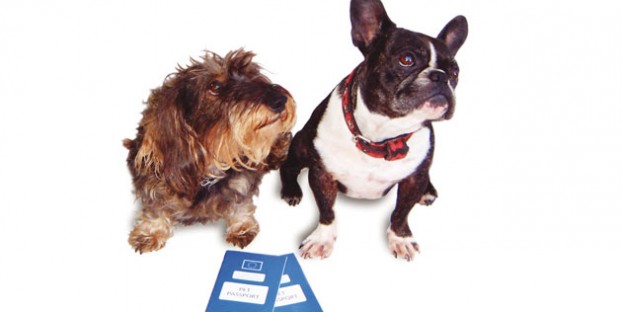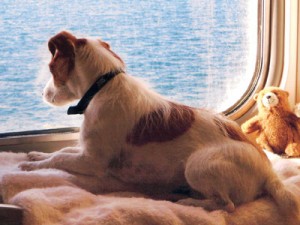
03 March 2014 by Jessica Boston
Dog-friendly Holidays in France & Spain!
Dog lovers are often keen to explore holiday options that suit their pets, and holidays in the UK seem to be the easiest option. However it is possible, with a little planning, to enjoy holidays with your canine friends in France or Spain too! Taking your dog on holiday can actually work out cheaper than booking them into boarding kennels and for most dogs the experience will be stress-free and fun!
Be prepared – passports, rabies, chips and worms!
Under the Pet Travel Scheme (PETS) there are a number of requirements that need to be fulfilled if you wish to take your pet abroad, so it is worth attending to them in advance, to ensure there are no untimely hitches to cause stress at the beginning of your holiday.
Pet passports
To go to France or Spain your dog will need a pet passport, just ask your vet and they will be able to provide one. The passport is part of the PETS Travel Scheme and will remain valid as long as your pet continues to meet the necessary requirements.
Micro-chipping
In order to validate their passport you will first need to have your dog micro-chipped. It’s easiest to have a microchip that meets ISO standards so transport companies can read it, but if you already have a non-standard microchip it is still valid if you bring your own microchip reader with you. The microchip number should be recorded on your pet’s passport.
Rabies vaccine
The next important step is to get your dog vaccinated against rabies. You need a microchip fitted first in order for the rabies vaccination to be valid. You are free to travel 21 days after the initial rabies vaccination. Make sure you keep up with booster jabs to ensure your pet’s passport remains valid.
Tapeworm treatment
You must get your dog treated for tapeworm between one and five days before arriving back in the UK. The vet will need to make a detailed record of the treatment in your pet’s passport in order for it to be valid. If you are going away for a weekend or short break you may be able to get your usual vet to carry out treatment before you travel. For longer holidays you’ll need to find a vet in France or Spain to administer the treatment within the accepted time frames.
Your dog will have its microchip scanned and passport checked before boarding the ferry and on your return so make sure everything is in order for a smooth trip. If it’s been a while since your dog’s chip was scanned you might want to ask your vet to double check it is where it should be – it’s very unlikely to have moved within the body, but if it has you don’t want to find out when officials can’t seem to scan it at the port!
Planning pet-friendly travel
 You must be sure to use a transport company that is authorised to carry pets into the UK. Brittany Ferries for example are approved. If you have a lot of dogs you may need to check with your operator to see if there is any limit to the number permitted per person. It’s worth noting that non-UK private boats and planes are not allowed to bring dogs into this country.
You must be sure to use a transport company that is authorised to carry pets into the UK. Brittany Ferries for example are approved. If you have a lot of dogs you may need to check with your operator to see if there is any limit to the number permitted per person. It’s worth noting that non-UK private boats and planes are not allowed to bring dogs into this country.
A ferry is a great choice for dog-friendly travel. On most of the shorter routes your pet will be able to stay in the familiar comfort of your car for the duration of the crossing. You are not allowed to remain with them on the car deck for safety reasons, but your car will be marked with a special ‘pet sticker’ and parked in a designated area to allow staff to check on dogs throughout the journey.
On longer ferry crossings such as to Spain kennels are provided for dogs to stay in; there is a choice of kennel size to suit your dog. Brittany Ferries’ vessel Cap Finistere goes a step further with seventeen pet-friendly cabins available and a dog exercise area on one of the nearby decks – book early to avoid disappointment, as these are rather popular! All dogs must wear a muzzle when in public areas at check in and during transfer to their kennels. On Brittany Ferries’ economie service to Le Havre or to Santander, you and your dog will need to book one of the thirteen pet-friendly cabins.
If you are worried about how your dog will manage in the car you can take some time to familiarise them by leaving them for short periods parked in an underground car park that offers a similar feel to the car deck of a ferry. Once on the ferry make sure your car is safe and secure with doors locked and windows open a little bit for ventilation – and don’t forget to disable the car alarm!
You will also need to provide water and snacks for the journey; a non-spill travel water bowl is a good idea. Get to the ferry terminal with some time to spare so you can take your dog for a bit of exercise and a toilet break before you board.
Hounds on holiday
Before booking accommodation be sure to check dogs are welcome. There are plenty of pet-friendly holiday cottages to choose from, and often these properties are owned by people who also keep dogs and can therefore advise you about the best walks, vets and dog-friendly restaurants or cafes in the area. French supermarkets stock a wide range of dog foods, but be aware you may not be able to buy your dog’s preferred brands so if your dog is sensitive to diet changes you might want to bring enough food with you.
The French and Spanish people like dogs and depending on the breed of your pet you might get a lot of attention from people wanting to say “bonjour!” Local dogs often spend time under café tables with their owners so many are well used to canine patrons who will offer water bowls and a warm welcome.
If you are travelling in peak season you will need to consider how your pets will cope with the heat – you might be hoping for long hikes through the countryside but if the temperature soars it might be too much for them to cope with.
Long car journeys are also a challenge for some dogs. Make regular stops – the ‘Aires’ wooded picnic areas that dot the motorways are particularly dog-friendly with drinking water taps to replenish your supplies.
You might feel it’s safer to keep your dog on a lead when abroad, but if you do plan to let them explore it might be a good idea to get a specially made tag for their collar with your mobile number including the international code or details of your holiday accommodation on it in case the worst happens and they get lost.
Taking your dog on holiday adds a new dimension of fun for everyone as they share the most important weeks of leisure time you have. Teach them the language and they’ll fit right in – “Woof!” is “Ouaf!” in French in case you were wondering. Try it once and the puppy-dog eyes will mean you’ll never leave them at home again!
Useful links
Brittany Ferries PETS Travel Scheme ferry information

Leave a comment